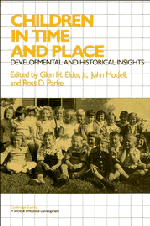Book contents
- Frontmatter
- Contents
- Preface
- Acknowledgments
- List of contributors
- Part I A proposal
- Part II Historical and life transitions
- Part III Life transitions across historical time
- Part IV The cross-disciplinary collaboration
- 8 The workshop enterprise
- 9 The elusive historical child: Ways of knowing the child of history and psychology
- 10 A paradigm in question: Commentary
- 11 Epilogue: An emerging framework for dialogue between history and developmental psychology
- Bibliography
- Author index
- Subject index
11 - Epilogue: An emerging framework for dialogue between history and developmental psychology
Published online by Cambridge University Press: 03 May 2011
- Frontmatter
- Contents
- Preface
- Acknowledgments
- List of contributors
- Part I A proposal
- Part II Historical and life transitions
- Part III Life transitions across historical time
- Part IV The cross-disciplinary collaboration
- 8 The workshop enterprise
- 9 The elusive historical child: Ways of knowing the child of history and psychology
- 10 A paradigm in question: Commentary
- 11 Epilogue: An emerging framework for dialogue between history and developmental psychology
- Bibliography
- Author index
- Subject index
Summary
This volume is a testimonial to cross-disciplinary dialogue as a potentially useful and rewarding intellectual exercise. In this epilogue, we briefly explore the implicit models of collaboration in this initial joint enterprise between social history and developmental psychology. Through omission and demonstration, the models suggest other possible forms of collaborative effort that could prove fruitful in the future.
These final remarks assume that cross-disciplinary dialogue is bi-directional in nature and that successful and sustained collaboration will become a reality only to the extent that the disciplines involved recognize its mutual benefits. If this cross-disciplinary enterprise is to succeed, a deeper understanding of the potential contributions of both disciplines needs to be achieved. Clearly, developmentalists should heed Zuckerman's observation that “the call for context meant merely an appeal for the provision of a prologue” and accept a richer definition of the meaning of historical context.
Redefinition of contextual variation would alter the framing of our questions and our expectations of answers – to paraphrase Zuckerman's astute call. As the positivistic legacy of the social sciences, including developmental psychology, begins to crumble (Sameroff, 1989), the door is open to a redefinition of contextual variation, although we are not sure whether the exploration will or can go as far as Zuckerman might hope. Similarly, receptivity to a wider range of theoretical frameworks beyond psychoanalysis is beginning to gain ground among historians. This development should enlarge the potential role that contemporary human-development models can play in interpreting historical data.
- Type
- Chapter
- Information
- Children in Time and PlaceDevelopmental and Historical Insights, pp. 241 - 250Publisher: Cambridge University PressPrint publication year: 1993
- 2
- Cited by

